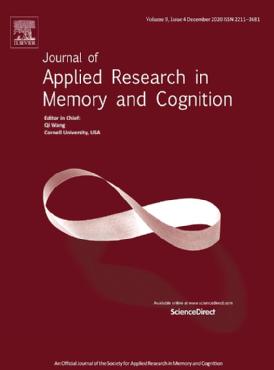New Publication: Providing Eyewitness Confidence Judgements During Versus After Eyewitness Interviews Does Not Affect the Confidence-Accuracy Relationship
COPR members Emily Spearing (PhD candidate, Psychology) and Dr Kim Wade (Psychology) have published a study in the Journal of Applied Research in Memory and Cognition, investigating at what point in an interview eyewitness should be prompted to provide judgements about how confident they are in their memory report.
Summary of the findings
A growing body of research suggests that highly confident eyewitnesses are likely to be highly accurate, at least under some conditions.
Yet most of what memory scientists know about the relationship between witness confidence and accuracy comes from eyewitness identification studies in which people watch a mock crime, before attempting to identify a perpetrator from a police lineup.
Few studies have investigated the relationship between the accuracy of eyewitnesses’ memory reports for crime-related details (e.g. the perpetrator’s features, actions etc) and their confidence in these reports.
The relationship between confidence and accuracy
There is no consensus on when confidence judgements should be elicited from witnesses during witness interviews. In three experiments, we investigated whether the relationship between confidence and accuracy is affected by when eyewitnesses give their confidence judgements.

Participants watched a mock crime video before completing a memory test for the event. Some participants gave their confidence judgements immediately after each response, whereas other participants only gave their confidence judgements after they had reported everything that they could remember.
The proportion of details correctly remembered increased with increasing levels of confidence, regardless of when these confidence judgements were taken. In addition, people appropriately reduced their confidence if their memory was reduced by poor visibility, but not when they were unknowingly exposed to misinformation.
These findings suggest that eliciting confidence judgements from witnesses at the end of their statements may not reduce their informative value any more than taking confidence judgements immediately after each response. Our data show, however, that people may become over-confident when they fail to notice factors that reduce their memory accuracy.
